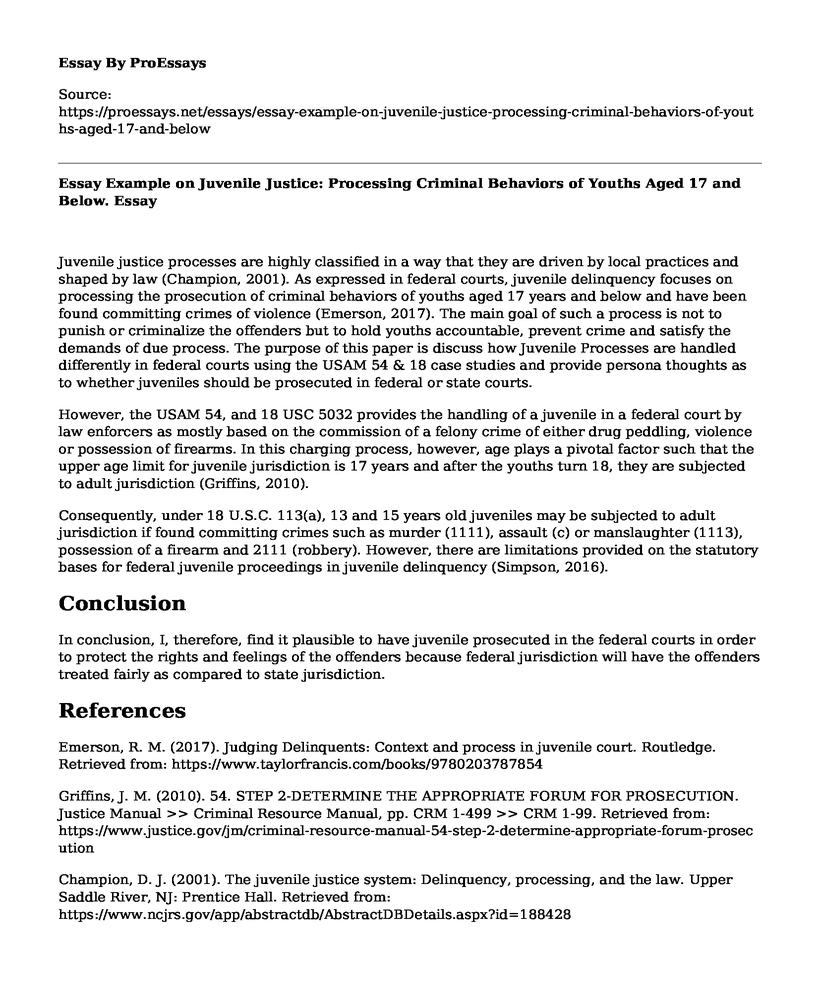Juvenile justice processes are highly classified in a way that they are driven by local practices and shaped by law (Champion, 2001). As expressed in federal courts, juvenile delinquency focuses on processing the prosecution of criminal behaviors of youths aged 17 years and below and have been found committing crimes of violence (Emerson, 2017). The main goal of such a process is not to punish or criminalize the offenders but to hold youths accountable, prevent crime and satisfy the demands of due process. The purpose of this paper is discuss how Juvenile Processes are handled differently in federal courts using the USAM 54 & 18 case studies and provide persona thoughts as to whether juveniles should be prosecuted in federal or state courts.
However, the USAM 54, and 18 USC 5032 provides the handling of a juvenile in a federal court by law enforcers as mostly based on the commission of a felony crime of either drug peddling, violence or possession of firearms. In this charging process, however, age plays a pivotal factor such that the upper age limit for juvenile jurisdiction is 17 years and after the youths turn 18, they are subjected to adult jurisdiction (Griffins, 2010).
Consequently, under 18 U.S.C. 113(a), 13 and 15 years old juveniles may be subjected to adult jurisdiction if found committing crimes such as murder (1111), assault (c) or manslaughter (1113), possession of a firearm and 2111 (robbery). However, there are limitations provided on the statutory bases for federal juvenile proceedings in juvenile delinquency (Simpson, 2016).
Conclusion
In conclusion, I, therefore, find it plausible to have juvenile prosecuted in the federal courts in order to protect the rights and feelings of the offenders because federal jurisdiction will have the offenders treated fairly as compared to state jurisdiction.
References
Emerson, R. M. (2017). Judging Delinquents: Context and process in juvenile court. Routledge. Retrieved from: https://www.taylorfrancis.com/books/9780203787854
Griffins, J. M. (2010). 54. STEP 2-DETERMINE THE APPROPRIATE FORUM FOR PROSECUTION. Justice Manual >> Criminal Resource Manual, pp. CRM 1-499 >> CRM 1-99. Retrieved from: https://www.justice.gov/jm/criminal-resource-manual-54-step-2-determine-appropriate-forum-prosecution
Champion, D. J. (2001). The juvenile justice system: Delinquency, processing, and the law. Upper Saddle River, NJ: Prentice Hall. Retrieved from: https://www.ncjrs.gov/app/abstractdb/AbstractDBDetails.aspx?id=188428
Simpson, A. L. (2016). Rehabilitation as the justification of a separate juvenile justice system. Calif. L. Rev., 64, 984.Retrieved from: https://heinonline.org/HOL/LandingPage?handle=hein.journals/calr64&div=51&id=&page=
Cite this page
Essay Example on Juvenile Justice: Processing Criminal Behaviors of Youths Aged 17 and Below.. (2023, Jan 29). Retrieved from https://proessays.net/essays/essay-example-on-juvenile-justice-processing-criminal-behaviors-of-youths-aged-17-and-below
If you are the original author of this essay and no longer wish to have it published on the ProEssays website, please click below to request its removal:
- Paper Example on Supporting Illegal Immigrants in the US
- Social Work Intervention Paper Example
- Article Analysis Essay on "Panama Papers Investigation: Four Men Criminally Charged in Us." By the Guardian
- Vernon Madison: Sentenced to Death Despite Diminished Mental Capacity - Essay Sample
- Essay Sample on Protecting Privacy: Ensuring Sensitivity & Secrecy
- Gender Disparity in Criminal Sentencing: Examining Inequalities - Research Paper
- Essay on Police Searches & Seizures: The Balance Between Civil Liberties & Society







